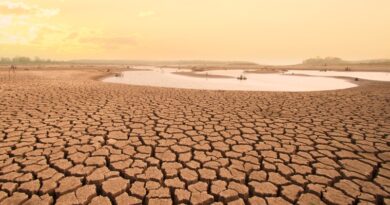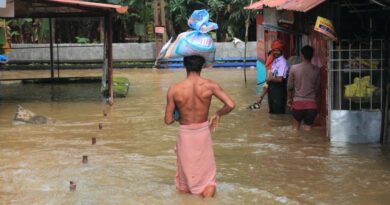Climate change accentuates water, food security shocks; ecosystems threatened: WMO

Four key climate change indicators have set new records in 2021 with extreme weather leading to hundreds of billions of dollars in economic losses and wreaking a heavy toll on human lives and well-being while triggering shocks for food and water security and displacement that have accentuated during 2022, according to the World Meteorological Organization (WMO).
Human activities are causing planetary scale changes on land, in the ocean, and in the atmosphere, with harmful and long-lasting ramifications for sustainable development and ecosystems, warned the WMO’s State of the Global Climate in 2021 report while confirming that the past seven years have been the warmest seven years on record.
The four climate indicators are greenhouse gas concentrations, sea level rise, ocean heat and ocean acidification.
Last year – 2021 – was “only” one of the seven warmest because of a La Niña event at the start and end of the year. This had a temporary cooling effect but did not reverse the overall trend of rising temperatures. The average global temperature in 2021 was about 1.11 (± 0.13) °C above the pre-industrial level, the report said.
The WMO report, released just ahead of the World Economic Forum 2022 annual meeting at Davos, said ecosystems including terrestrial, freshwater, coastal and marine ecosystems – and the services they provide, are affected by the changing climate and some are more vulnerable than others.
“Some ecosystems are degrading at an unprecedented rate. For example, mountain ecosystems – the water towers of the world – are profoundly affected. Rising temperatures heighten the risk of irreversible loss of marine and coastal ecosystems, including seagrass meadows and kelp forest. Coral reefs are especially vulnerable to climate change. They are projected to lose between 70 and 90 per cent of their former coverage area at 1.5 °C of warming and over 99% at 2 °C. Between 20 and 90 per cent of current coastal wetlands are at risk of being lost by the end of this century, depending on how fast sea levels rise. This will further compromise food provision, tourism, and coastal protection, among other ecosystem services”, said the report.
There could be serious implications on food security too, said the report. The compounded effects of conflict, extreme weather events and economic shocks, further exacerbated by the COVID-19 pandemic, undermined decades of progress towards improving food security globally. Worsening humanitarian crises in 2021 have also led to a growing number of countries at risk of famine. Of the total number of undernourished people in 2020, more than half live in Asia (418 million) and a third in Africa (282 million).
On flooding, the report noted that it induced economic losses of $17.7 billion in Henan province of China, and Western Europe experienced some of its most severe flooding on record in mid-July associated with economic losses in Germany exceeding $20 billion. There was heavy loss of life.
Drought affected many parts of the world, including the Horn of Africa, Canada, the western United States, Iran, Afghanistan, Pakistan and Turkey. In sub-tropical South America, drought caused big agricultural losses and disrupted energy production and river transport. The drought in the Horn of Africa has intensified so far in 2022. Eastern Africa is facing the very real prospect that the rains will fail for a fourth consecutive season, placing Ethiopia, Kenya and Somalis into a drought of a length not experienced in the last 40 years. Humanitarian agencies are warning of devastating impacts on people and livelihoods in the region, the report added.
“It is just a matter of time before we see another warmest year on record,” said WMO Secretary-General Professor Petteri Taalas.
“Our climate is changing before our eyes. The heat trapped by human-induced greenhouse gases will warm the planet for many generations to come. Sea level rise, ocean heat and acidification will continue for hundreds of years unless means to remove carbon from the atmosphere are invented. Some glaciers have reached the point of no return and this will have long-term repercussions in a world in which more than 2 billion people already experience water stress.”
“Extreme weather has the most immediate impact on our daily lives. Years of investment in disaster preparedness means that we are better at saving lives, though economic losses are soaring. But much more needs to be done, as we are seeing with the drought emergency unfolding in the Horn of Africa, the recent deadly flooding in South Africa and the extreme heat in India and Pakistan. Early Warning Systems are critically required for climate adaptation, and yet these are only available in less than half of WMO’s Members. We are committed to making early warnings reach everyone in the next five years, as requested by the United Nations Secretary-General Antonio Guterres,” said Taalas.



